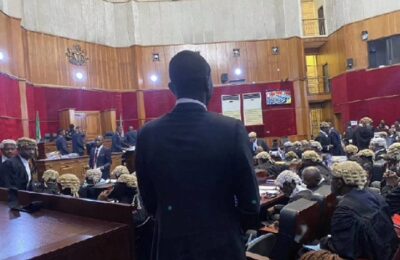The burden of resolving the question which arose from the conduct of election into the Office of Governor of Kogi State on 21/11/2015 and 5/12/2015 by the Independent National Electoral Commission has been firmly shifted to the hallowed chambers of the apex Court in the land, that is, Supreme Court.
Premised on the fact that the decision of the Court of Appeal was delivered on 4/8/2016, it is not out of place to state that the Supreme Court has up to 2/10/2016 to hear and determine the appeals arising from the said decision. This is pursuant to the sixty (60) days allowed for the hearing and determination of appeals by the provisions of section 285(7) of the 1999 Constitution of the Federal Republic of Nigeria (as altered). In actual point of fact, the apex Court has about twenty-three (23) days from today, to hear and determine the said appeal.
Taking a keen look at the last date for the determination of the election appeal, that is, Sunday, 2/10/2016, it becomes clear that the Supreme Court in the quest for justice must determine the appeals at least by Friday 30/9/2016, otherwise, the appeals will lapse and be buried for all time (Amadi v. INEC (2013) 4 NWLR (Pt. 1345)595 @ 637, Paras. A-C). Once dead, such dead appeal can never be revived by any Court in the land and the incumbent, Alhaji Yahaya Bello will continue in office unchallenged.
While expecting the Supreme Court to do the needful before the effluxion of time, that is, to hear and determine the appeal within the next twenty-three (23) days, I seek to revisit the issue of whether Alhaji Yahaya Bello was properly and lawfully substituted for the deceased Prince Abubakar Audu.
Upon a careful look at the provisions of the Electoral Act, 2010 (as altered) it thus appear that there exists a lacuna in that no specific mention was made of the steps to take in replacement of a Governorship candidate who dies after poll had commenced. On this issue, the Court of Appeal, in its decision in the appeal of Captain Idris Ichalla Wada & 2 Ors. V. Yahaya Bello & 2 Ors. (Unreported) CA/A/EPT/383/2016 delivered on 4/8/2016 held that:
“Perhaps, there is no provision of the law specifically on the replacement of a candidate who dies before the election is concluded, however I do agree with the Respondents that the conclusion of the Tribunal that the 1st Respondent was qualified and duly returned is supported by law.”
The decision of the Court of Appeal, recited above was hinged on the provision of section 33 of the Electoral Act (supra). The said section 33 provides that:
“A Political Party shall not be allowed to change or substitute its candidate whose name has been submitted pursuant to section 31 of this Act, except in the case of death or withdrawal by the candidate.”
Affirming the decision of the Election Tribunal (per H.S. Mohammed, J., etal), the Court of Appeal, upon an interpretation of section 33 of the Electoral Act, 2010 (supra) held that:
“Clearly section 33 of the Electoral Act 2010 (as amended) allows a political party to substitute a deceased candidate with another candidate at any time before the conclusion of the election.”
It is clear from the foregoing, that the decision of the Court of Appeal that Alhaji Yahaya Bello was properly and lawfully substituted for the deceased Prince Abubakar Audu is hinged on the provision of section 33 of the Electoral Act (supra).
It is the respectful view of the present writer that section 33, Electoral Act (supra) does not clothe a political party, the All Progressives Congress (APC) inclusive with powers to replace a deceased candidate with another candidate at any time before the conclusion of election. This view is hinged on the fact that in statutory construction, it is trite that the provisions of a Statute (the Electoral Act inclusive) must be construed as a whole. It must then be stated that section 33 of the Electoral Act (supra) cannot be interpreted in isolation of sections 36, 87 and 141 of the Electoral Act (supra).
Section 36(1) of the Electoral Act (supra) provides for where a nominated candidate dies after the nominations papers have been delivered to the Independent National Electoral Commission (INEC). Where such arise, INEC is vested with powers to countermand the polls and appoint another date for conduct of election. This section is not to the legal questions arising from the conduct of election into the office of Governor of Kogi State.
It is not in dispute that a political party has statutory right to nominate a candidate or substitute same when such candidate withdraws from the election or becomes deceased. It will however be wrong to interpret this statutory right to substitution where the nominated candidate dies after commencement of election. The question which then must be answered is whether it is right for a political party to wake up one day and substitute a deceased candidate with any of its members without recourse to conduct of primaries. This issue is relevant because the issue of conduct of primaries in respect of election into the office of Governor of a State is amply provided for by section 87(1), (2), (3), (4)(b) (i) & (ii) of the Electoral Act (supra)?
While it may be contended that Captain Idris Ichalla Wada lacks requisite locus to challenge the nomination of Alhaji Yahaya, it is needful to state that a distinction must be made between a challenge raised to nomination simpliciter and a challenge raised in respect of a whether or not a candidate of a political party has been properly substituted for another candidate. The relevant issue herein is not a challenge to the valid nomination or otherwise of Alhaji Yahaya Bello by the APC (as he was never nominated pursuant to section 87 of the Electoral Act, anyway). The burning issue is whether Alhaji Yahaya Bello was properly and lawfully substituted for the deceased Prince Abubakar Audu and the Supreme Court has held in a plethora of judicial authorities that it is within the jurisdiction of the Court to hear and determine issues arising from whether a candidate has been properly substituted with another (Akpan v. Bob (2010) 17 NWLR (Pt. 1223)421 @ 521, Paras. C-D, per Onnoghen, JSC).
While not seeking to bore you with further details, I hurriedly seek to consider the appropriate law governing the issue of what both the APC and INEC ought to have done upon the demise of Prince Abubakar Audu after the commencement of voting in the election conducted into the office of Governor of Kogi State on 21/11/2015.
It is important to remember at this stage that judicial precedent constitutes one of the sources of law in Nigeria and that the doctrine of judicial precedent helps to establish certainty in law (Wambai v. Donatus (2014) 14 NWLR (Pt. 1427)223 @ 247, Paras. B-D).
It is the humble view of the present writer that in view of the apparent lacuna in the Electoral Act (supra), the relevant judicial precedent is the Supreme Court decision in the case of P.D.P. v. I.N.E.C (1999) 11 NWLR (Pt. 626)200 @ 240, Paras. C-E, where Uwais, C.J.N. (as he then was) observed that:
“There are three stages or phases in the process of a person contesting election to become a Governor or Deputy-Governor. The first stage is before and up to the holding of the election. The second stage is after having been elected but pending the assumption of office. The third stage is on assumption of the office of Governor or Deputy Governor after declaring his assets and taking the prescribed oaths……..
During the first period or stage, if the gubernatorial candidate dies or withdraws from the election or is permanently incapacitated, it seems to me that there has to be a fresh nomination of both candidate and his running mate because the latter gets disqualified by reason of death, withdrawal or incapacity.”
For purposes of clarity, it is vital to state that it is settled law that the word ‘election’ means exercise of adult suffrage, which involves voters, materials for voting and supervision and counting of votes by electoral personnel (Ojukwu v. Obasanjo (2004) 12 NWLR (Pt. 886) 169 @ 221, Paras. D-E). It is thus clear that voting is only specie of the genus or process referred to as election. The word ‘election’ is thus a generic term; a process which embraces the entire gamut of activities ranging from accreditation, voting, collation to recording on all relevant INEC Forms and declaration of results (Ogboru v. Uduaghan (2011) 2 NWLR (Pt. 1232)538 @ 589, Paras. F-H).
An appreciation of the relevant decisions in P.D.P. v. I.N.E.C. (supra); Ojukwu v. Obasanjo (supra) and Ogboru v. Uduaghan (supra) thus provides an understanding that where a gubernatorial candidate dies in the course of or between the period ranging from accreditation of voters, casting of ballot/voting, collation to recording on all relevant INEC Forms and declaration of results, the proper thing to do in law is to allow the affected political party to do fresh nomination of both a gubernatorial candidate and his running mate.
The scenario in the conduct of election into the office of Governor of Kogi State on 21/11/2015 best fits into the first stage in the conduct of election as identified by the Supreme Court. This is hinged on the fact that the death of the candidate of the All Progressives Congress (APC) occurred in the period between casting of votes and collation of results. It is thus the position of the present writer that the appropriate step INEC should have taken is to postpone the conduct of election while the APC conducts fresh nomination of both a gubernatorial candidate and his running mate and not mere substitution as was done.
Section 87 of the Electoral Act (supra) protects the equal opportunity of all aspirants on the platform of the APC to being voted for by members of the party in party primaries. Indeed, this is the essence of election in a democracy, that is, to determine the wishes of the people (members of the APC in Kogi State) as to who to represent them in the election into the office of Governor of Kogi State (A.P.G.A. v. Ohakim (2009) 4 NWLR (Pt. 1130) 116 @ 175, Para. E). The Court of Appeal thus misdirected itself in law when it affirmed the decision of the Tribunal that Alhaji Yahaya Bello was properly substituted for Prince Audu having been the closest alternative premised on an earlier on conducted primaries. This finding lacks foundation in law as same offends the fundamental provision of section 87 of the Electoral Act (supra). It is only when section 87 of the Electoral Act (supra) is complied with that section 141 of the Electoral Act (supra) can be consequently complied with.
In conclusion, the position of the present writer is that, having been substituted without fresh nomination of candidates for the office of Governor and Deputy-Governor, Alhaji Yahaya Bello was not properly and not lawfully substituted for the deceased Prince Abubakar Audu.
As Kogites wait with baited breath, it is anticipated that the Supreme Court will follow its decision in P.D.P. v. I.N.E.C. (supra) and nullify the elections conducted into the office of Governor of Kogi State on both 21/11/2015 and 2/12/2015; set aside the Certificate of Return issued to Alhaji Yahaya Adoza Bello; order fresh nomination of candidates for the All Progressive Congress (APC) and finally to order that INEC should conduct fresh election into the office of Governor of Kogi State. This will not only satisfy the dictates of the law but concur with the voice of God who in Ezekiel 21:27 said:
“I will overturn, Overturn, it: and it shall be no more, until he come whose right it is; and I will give it him.”
– Barrister Femi Olawale




